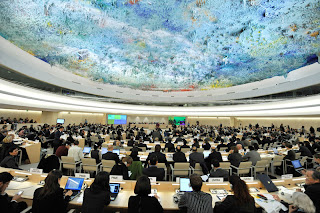Being back in Geneva for the 24th session of the
UN Human Rights Council (HRC) has given me a fresh perspective on the work of
human rights bodies, the politics of the HRC, and the role civil society plays
within these structures. When most people think of human rights, they imagine
the broad, liberal ideals for mankind that only seem to be demanded by
political dissidents and touted by the global North. The reality, as seen
through the prism of various human rights mechanisms and their processes,
paints a far different picture of political and
diplomatic maneuvering and the relatively universal demand and application of human rights. Today, the fight to protect, promote and enshrine human rights principles is indeed a globalized endeavor complete with the complexities and nuances that come with it. It is within this context that HRC member states implement human rights strategies for their countries and others.
diplomatic maneuvering and the relatively universal demand and application of human rights. Today, the fight to protect, promote and enshrine human rights principles is indeed a globalized endeavor complete with the complexities and nuances that come with it. It is within this context that HRC member states implement human rights strategies for their countries and others.
This past week, the HRC began with the backdrop of human
rights abuses old and new. The massive humanitarian crisis
in Syria and Egypt’s troubling leap away from democracy via military coup took
center stage in the early proceedings, briefly overshadowing both enduring abuses
and relatively new issues, such as LGBT rights. Recurrent human rights abuses, like sexual and gender-based violence and
the criminalization of freedom of expression and opinion, also received
attention and spurred discussion. And aside from the hot-button issues that
dominate the main chambers of the Council, states and NGOs hold their own side
events that typically shed light on narrower issues, such as informal
negotiations to extend the mandates of Special
Rapporteurs (human rights experts appointed by Special Procedures) and the human rights
situation in the Middle East and North Africa.


